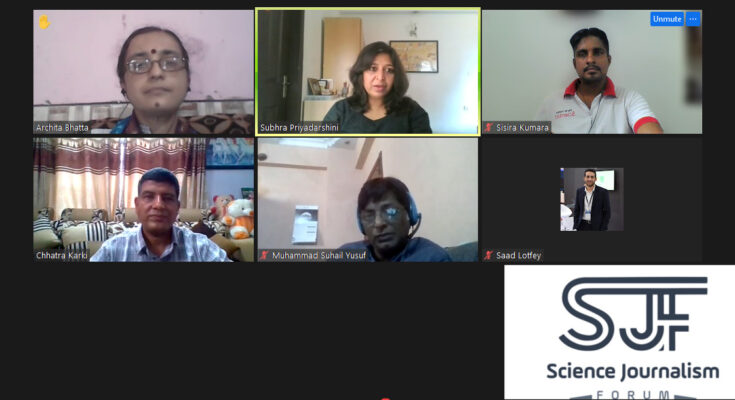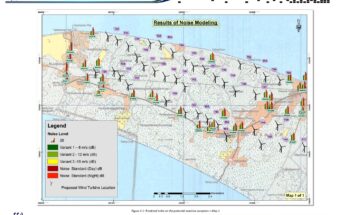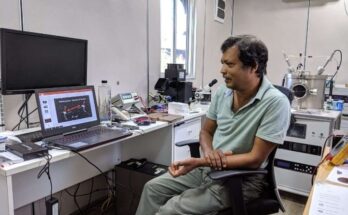In a special panel discussion during the world science journalists forum, a panel of science journalists representing countries in South Asia discussed the role science journalists can play towards ensuring vaccine equity in the region. Sisira Kumara, Editor, the Sri Lankan Scientist Magazine, Chhathra Karki from the Nepal Forum of Science Journalists, Archita Bhatta, Editor, Vigyan Prasar, India, Subhra Priyadarshini, Chief Editor, Nature India and Muhammad Suhail Yusuf, Science Writer and Editor, Express Tribune Media Group, Pakistan participated the discussion.
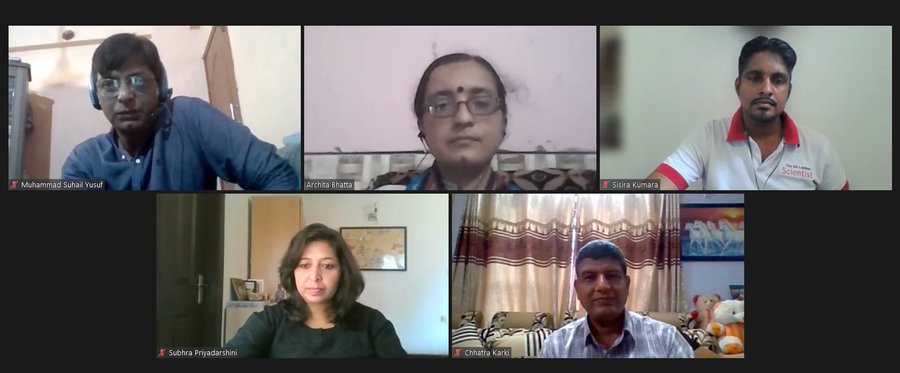
Organized with the aim of sharing new ideas and thoughts in science journalism among science journalists, writers, publishers, scientists, students, and academia, the Science Journalism Forum 2021 is now underway as a virtual event. During this week long event science journalists with a huge range of other resource personnel will share their knowledge with the aim of upgrading the skills of journalists all over the world with a focus on developing countries.
Journalists shared their experiences on issues with the vaccine equity in their countries and talked about how the journalism has helped mitigate the issues. Representing Sri Lanka Mr. Sisira Kumara participated the discussion. Sisira sharing his experiences highlighted the National Immunization Program in Sri Lanka which has been considered one of the best immunization programs in the world. At the same time he emphasized the factors behind the success of this immunization program that included, the free health service system of the country, highly effective organizational structure of the health service, political support (or the lack of political interferences) and higher literacy rate among Sri Lankans.
“But since early 2020, COVID-19 has posed New Challenges for the country’s public health system including the National Immunization Program.”
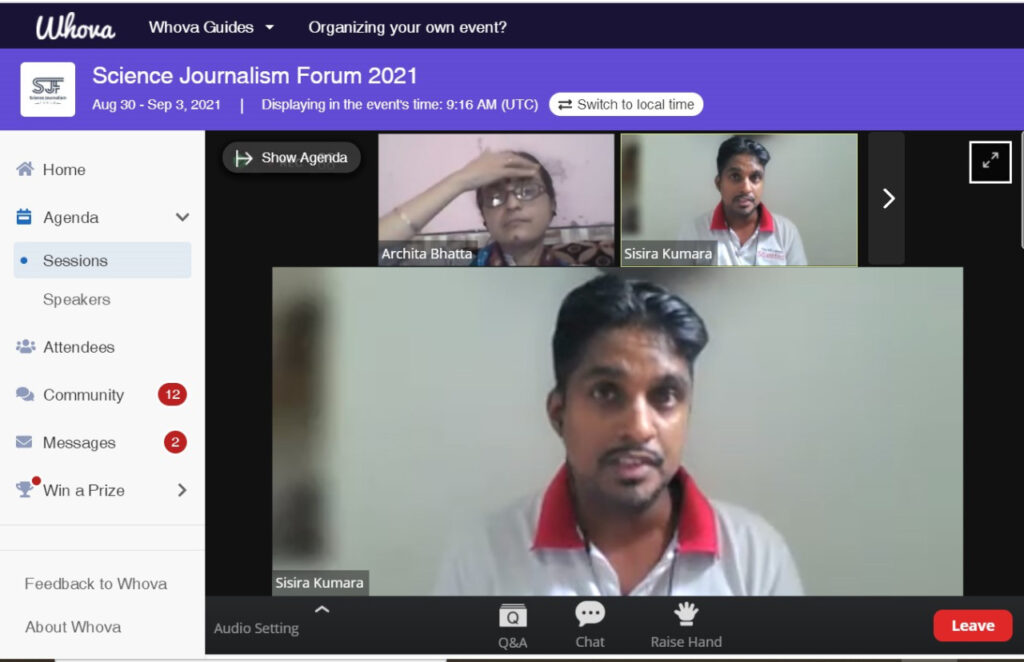
“COVID-19 caught the country and the health system off-guard. This in turn has created some vaccine inequity issues in Sri Lanka.” Sisira explained. Further he listed out few instances where the vaccine equity has been disturbed here in Sri Lanka.
“ 1. During the initial phase of the pandemic the government was unable to acquire enough vaccines created delays and complications in vaccine rollout and many people in urgent need could not get their vaccine on time.
2. Sri Lanka’s health authorities announced in early 2021 that they will follow WHO recommendations in giving vaccines to priority groups. In particular, three priority groups were mentioned: the frontline health workers and other key frontline workers actively involved in COVID-19 outbreak management; older age groups; and persons with co-morbidities. However, in some parts of the country this was not strictly followed creating confusion and protests.
3. Regional inequity – The vaccine rollout process in Sri Lanka focused on the highly populated parts of the country first, specially people in the western province got their vaccine first and there are some places in Sri Lanka that has not received the vaccines yet, or not enough numbers covered.
4. Emergence of fake alternative medicines – To profit from public concerns on COVID-19, some individuals and groups have been coming up with various treatments that claim to prevent or cure the viral infection. But none of these had any scientific basis behind them. Sadly, thousands of people who believed in these fake cures have spent their money and consumed these treatments. Such people have developed a false sense of security of being protected against the virus and are hesitant to get vaccinated.
5. Disinformation pandemic fueled by social media has also created some unnecessary fears or suspicions among some people about specific vaccines. Some of these are due to vaccine conspiracy theories that are internationally circulating which have been shared locally on social media.
According to other journalists in this discussion these same problems prevails in their countries as well, but may be in different proportions. For an example according to Chhathra Karki the regional vaccine inequity is a major issue in Nepal created mainly because of geographical difficulties that has affected the efficiency of their vaccination program. Similarly, in Pakistan also low literacy rate among some of the rural tribal groups and disinformation and misinformation have prevented some of the communal groups from taking their vaccine jabs, Mohammad Suhail mentioned.
In the second part of the discussion the journalists discussed the role journalists and science communicators can play in ensuring vaccine equity in the region.
Giving out few examples from Sri Lanka, Sisira explained some of the instances the journalists have come up and helped resolving some of the issues that led towards indirect vaccine inequity within the country.
• Spreading basic scientific information on the pandemic and precautions needed to avoid being infected
• Reporting and commenting on COVID-19 responses by the health authorities, medical professionals and health sector trade unions
• Highlighting lapses and gaps in vaccine roll-out efforts: provincially based reporters and websites have been doing a lot of good work
•Investigating and exposing the unproven treatments being marketed without any regulatory approval
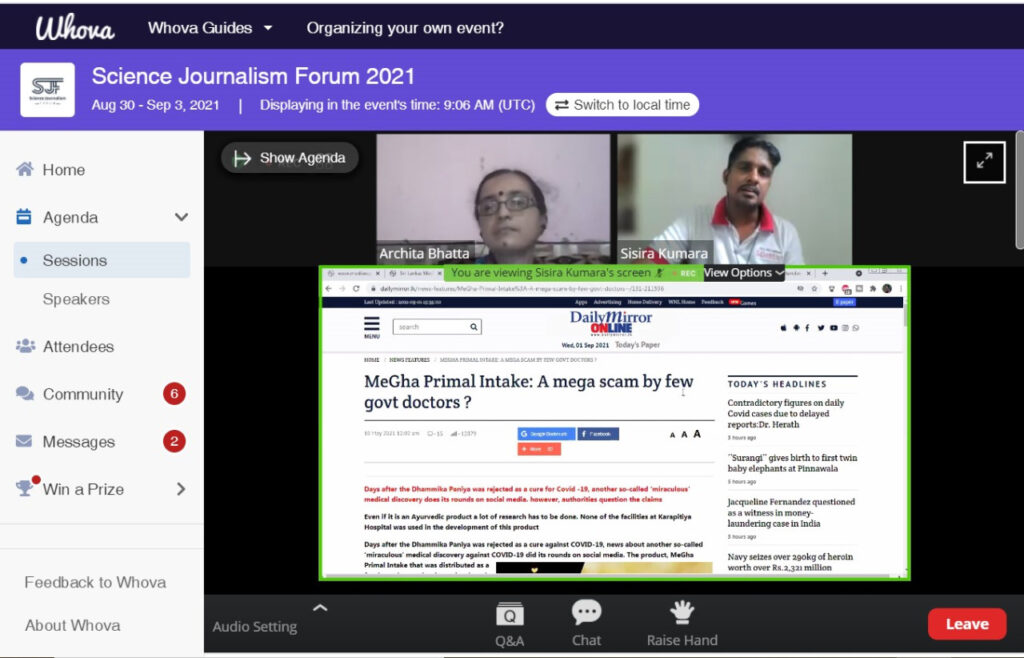
• Reporting on scientific research related to the pandemic that contributes to a better understanding of the virus and variants
• Promoting vaccination and immunization as a matter of public service and public interest
• Analysing COVID-19 case data, fatality data and vaccine coverage data to identify trends and highlighting what needs urgent attention from policy makers and health care providers
Other journalists also discussed how the journalists in heir countries have contributed towards establishing vaccine equity in their countries with examples.
The Science journalism Forum 2021 will have sessions, keynotes, and panel discussions all the way up to 3rd August (Friday). This year the event has been organized as an online event due to the COVID 19 Pandemic situation prevailing through out the world.

